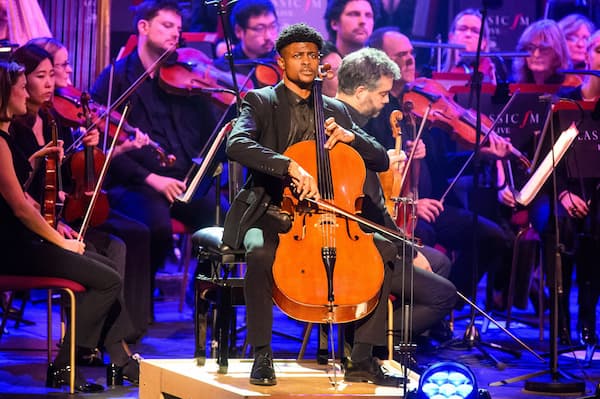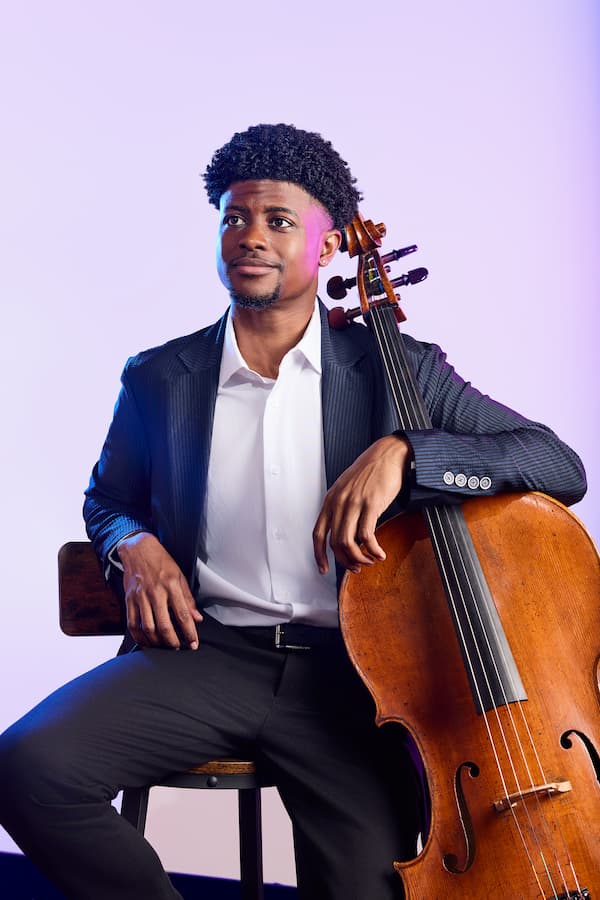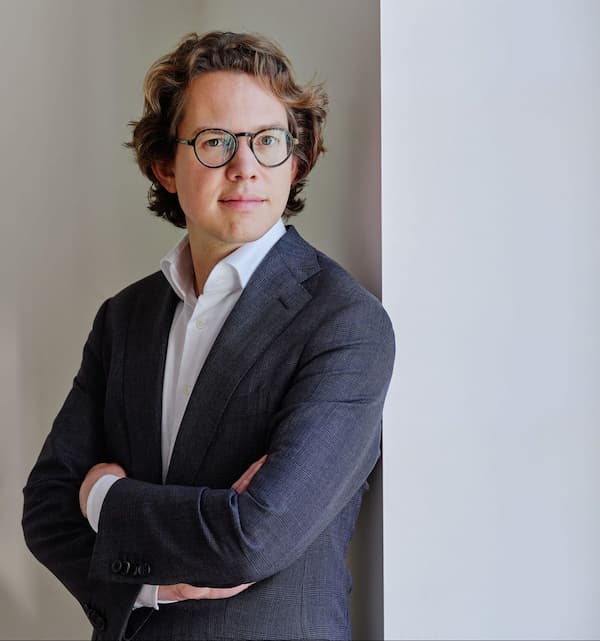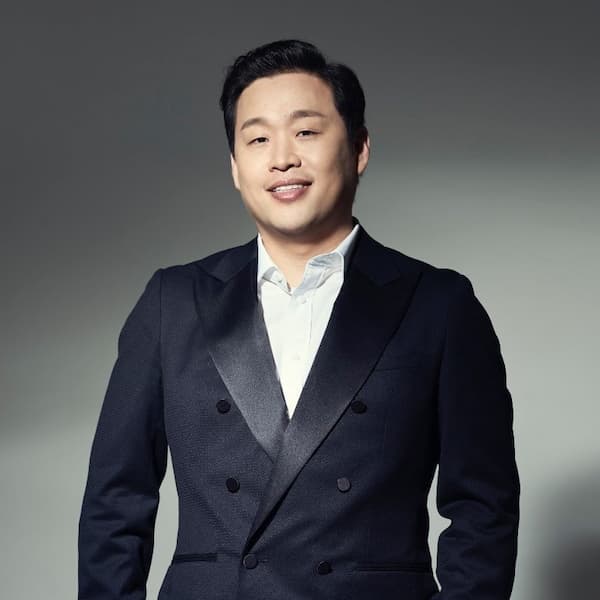Music is a ‘never-ending pursuit, and I love it’

Sterling Elliott © Titilayo Ayangade
I caught young cellist Sterling Elliott towards the end of a mammoth tour of the USA with the Chamber Music Society of Lincoln Center, having visited New York, Kansas, Illinois, Arizona, South Carolina and Virginia, performing with artists including Wu Han, Paul Neubauer and Anthony Manzo. This tour adds to an already impressive and ever-growing list of high-profile engagements; as he nears the end of his Artist Diploma at New York’s Juilliard School, Sterling looks ahead to bolster his already impressive and ever-expanding list of concert engagements, both at home in the US and across Europe.
His collaborations with the UK-based Young Classical Artists Trust have led to concerts in Wigmore Hall, and Sterling’s European engagements include performances at the Hamburg Elbphilharmonie, Berlin Konzerthaus and Concertgebouw. At home he has performed with the Philadelphia Orchestra, New York Philharmonic, Los Angeles Philharmonic, Detroit Symphony and Dallas Symphony.
I chatted to Sterling about his recent tour and his quest to bring undiscovered and new works to audiences on both sides of the Atlantic. What also surfaces is a surprising hobby that still manages to satisfy his musical curiosity…
How’s the tour been going?
It’s been great. I just got home a couple of hours ago! [The tour] is definitely something I’ve been enjoying. In my undergrad and master’s years I was still doing quite a lot of things on the road where I had to take the earliest flight possible out and back to get back for class, so it’s wonderful to be at what feels like I guess the ‘full adult stage’ and just be travelling solely and focusing on the playing!
What are your plans for after you finish at Juilliard?

© Matt Crossick and Classic FM
I’m really excited to just continue what I’m doing now, which is primarily a lot of solo performances and concerti. As of these days, I’m playing both in the States and a lot in the UK, through my partnership with YCAT [the Young Classical Artists Trust], getting to play with the BBC orchestras through the BBC New Generation scheme.
Chamber music is one of the big things that’s also coming into my seasons now, including this tour I’m doing at the moment as part of the Chamber Music Society of Lincoln Center, and I want to continue to teach on the road as well. That’s definitely kept me busy so far!
What has your experience been working in Europe compared to the US?

© Titilayo Ayangade
It was always something that I was so excited to experience firsthand, having had so many mentors and peers from Europe. Having done my first solo concert abroad just over a year ago, it’s been really wonderful starting to partner with a lot of pianists and now orchestras in Europe.
There are areas of teaching and learning in the States that come with them similar ways of thinking – which are absolutely wonderful – but now, starting to hear different anecdotes from different mentors who are in Europe has been great as I’m coming through an openness of new musical ideas. For me, I just feel like I’m widening my horizons.
As a student at conservatory, we might be working in-depth with a piece for an entire semester, half a year, but once we’re in the professional world in the States we’re working with two or three rehearsals maximum before the performance – and in Europe it can be just one rehearsal.
I like to think that I was very used to being efficient with what’s necessary to mention [in rehearsals] and which ideas were worth just leaving to the onstage interactions, but I do think that comes as even more of an extreme in Europe.
You need to be more intentional about all of your ideas, all of your unspoken ideas, and to show and lead simply by doing, as opposed to playing through and then discussing what might be done differently.
Elgar’s Cello Concerto (I & II)
What’s on your musical bucket list?
My bucket list, especially for recital works, is continuously growing. I quite literally have a list and every single time, for the past couple of years now, when I end up programming concerts, it always starts from this list that I have.
There’s one concerto that’s been on my mind for some time, and it’s Victor Herbert’s second cello concerto, which is an amazing piece. I performed it once when I was around 14 years old, this being the piece that inspired Dvořák to write his legendary cello concerto.
It’s a truly wonderful piece. I’ve been exploring American works and composers – the current recital programme that I’m touring is an all-American programme – and I’ve been toying with the idea of an all-American concerto album.
[The Herbert] is one of the pieces that I was thinking of having as the centrepiece of this album. Victor Herbert was lauded as this American composer while being an immigrant himself, which at the time is of course what it meant to be American, so it would be an amazing launching point for a discussion of what it means to be American, and of the American experience around the turn of the 20th century when he was writing this piece.
Is it right that you initially wanted to play the violin?
I grew up hearing the violin, even before I was born! The inspiration and influence of the violin has never stopped.
Once I started playing the cello I fell completely in love with all the roles that we cellists get to do, like being the rhythmic and harmonic foundation of things, particularly in string quartets. However, a lot of the works I’ve been doing for cello have been transcriptions of violin pieces. Most recently I’ve performed Ravel’s first violin sonata (published posthumously), which has been incredible, and coming up is the William Grant Still violin suite, so I’ve always enjoyed stealing violin works if I think they’re viable!
Sterling Elliott Plays Rachmaninoff’s ‘Vocalise’
It seems like you’re keen to expand the cello repertoire beyond what is traditionally expected?
I would say the bulk of what I love to play all the time are these classic traditional works, something like the Brahms sonata or the Franck sonata, but I’ve always loved including something that an audience has most likely never heard, something new. And that ‘something new’ can come in so many different forms.
For me, in an all-French programme that I was doing last year, this Ravel violin sonata was one of the ‘new’ works. Not only is it a piece that violinists themselves commonly don’t know exist, but even if they have, they won’t have heard it on the cello.
In my current all-American programme, the new piece could be a work by Kevin Day, whose sonata I’m currently playing. It could vary from contemporary new works to discovering older ones which I think have missed their time in the spotlight.
Highlighting these pieces has been one of my favourite things, and I love hearing the response from audience members who had never heard these works but who then want to go and look more into these composers.
Kevin Day has been one of the biggest crowdpleasers on the programme. Everyone loves his music and that sonata so much. Of course I hope that everyone loves every piece on the programme, but one of the things I talk about when I introduce Kevin Day’s style is that I feel like he writes this ‘feel good’ music. I don’t think I could have expected just how much of a response his music evokes from audience members.
Sterling Elliott and the Minnesota Orchestra: Tchaikovsky’s Variations on a Rococo Theme
What do you do in your spare time?
Back in Virginia (where I was born and raised) I grew up wanting to be an engineer, before a cellist, so I’ve always been attracted to the idea of tinkering with things. When it came time for me to learn how to drive a car, my mother was driving a stick-shift. I was learning how to drive this stick-shift and I just could not release my fascination with how it worked. I fell deep into the world of cars and so my favourite pastime is building and working on race cars in my home garage in Virginia.
It’s primarily a ‘building’ thing rather than a ‘racing’ thing – I didn’t expect how much the speed would actually scare me! – so for me it’s much more just about the process of it.
It took me so long to discover what in the world building cars has to do with music, and for many years I couldn’t really give a precise answer, but recently it really hit me over the head and I don’t know how I didn’t see it before: it’s the exact same diagnostic process.
Not only do they both have blood, sweat and tears, but there’s this idea of whenever you’re working with cars or music, you’re always trying to improve. You might identify a problem, and I just love going through the checklist of ‘it can only be so many things’ that can be improved: is it something to do with the bow? The sound, the contact point? The fuel lines?
I enjoy that search, of going through all the avenues that do not yield the result you’re looking for, but which still makes you more knowledgeable about everything you’re doing, and then to encounter something which could be such a small problem – just one shift or finger that you’re not the most flexible on – which then expands your workload for the next week or year.
There’s also finishing the job: people say that project cars are never finished, and it’s the same with music. Of course we’re never finished – there’s this never-ending pursuit, and I love it.
For more of the best in classical music, sign up for our E-Newsletter




